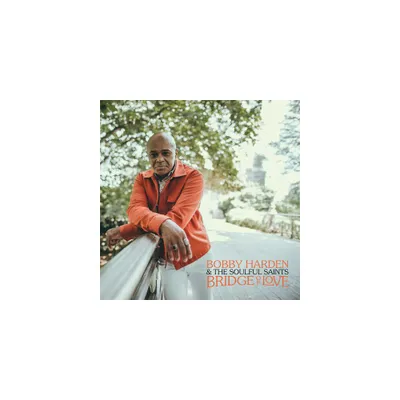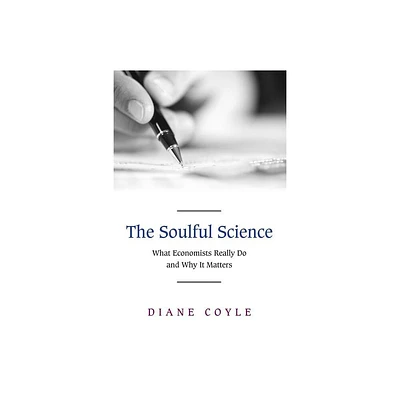Home
Soulful
Loading Inventory...
Barnes and Noble
Soulful
Current price: $14.99


Barnes and Noble
Soulful
Current price: $14.99
Loading Inventory...
Size: OS
*Product Information may vary - to confirm product availability, pricing, and additional information please contact Barnes and Noble
Ruben Studdard
won the second
American Idol
competition in 2003, but by the time he released his debut album,
Soulful
, in December of that year, it seemed like he was the runner-up to
Clay Aiken
, the competition's second-place contestant.
Clay
captured the heart of the preteen girls at the core of
AmIdol
's audience, since he was the perfect make-believe boyfriend: kinda cute, skinny and nonthreatening, singing songs of puppy love.
Ruben
was kinda cute, gigantic and nonthreatening, singing songs styled after his idol
Luther Vandross
-- soulful late-night grooves that didn't quite fit the old-fashioned
pop
sensibilities of
.
Studdard
's consistently satisfying, easygoing performances and taste for material slightly older than the
demographic made him a favorite of the judges, and a favorite of an audience wanting to prove that the show wasn't just churning out prefabricated
stars. Throughout the season,
was favored to win -- sometimes even singing as if the outcome was a foregone conclusion -- but
had a serious surge of support that threatened to knock
out of the catbird's seat.
Aiken
's popularity continued to grow even after he lost the competition, causing the label to scrap plans for the pair to release competing albums on the same day, since when the duo simultaneously released singles -- both crawling, undistinguished
adult contemporary
ballads
--
bested
. Since it would be poor form for the winner to lose on a large scale, the dueling discs were pushed aside and
was given extra time to work on his debut, making it less MOR, well, more
. This was a smart move, since it drew a clear distinction between him and
while appealing to the
urban
audience that always loved
's
Luther
-isms. Also, by targeting the album at
audiences, the producers gave
a set of tracks heavy on slow grooves and sensual feel, not songs that would require him to stretch his vocal limits. In other words, most of
consists of cuts that are about the feel of the production, from the shiny surfaces to the languid late-night beats, and not on songs that have strong, memorable verses and choruses. This works to the album's favor, at least as a piece of cohesive product, since it maintains a steady groove and feel from beginning to end. However, it does so by drawing attention away from
's voice.
Perhaps it was the constant work -- the show, followed by recording, followed by touring, followed by more recording -- but
's voice is not nearly as impressive on record as it was on the show, rarely sounding velvety and smooth, but rather sounding flat, thin, and raspy. This is most evident on the covers, particularly since he tackles songs associated with rich, robust singers. Compare his
"How Can You Mend a Broken Heart"
to that of
Al Green
. In the good Reverend's hands, this classic from
the Brothers Gibb
soared, but here it's decidedly earthbound, as is his stumbling take on
's version of
the Carpenters
'
"Superstar."
Surely, this tendency factored into the decision to move
away from songs and toward lush productions and grooves, and while the production work disguises
's weaknesses, they're not entirely hidden, particularly because the de-emphasis on melody oddly draws attention to any fluctuation in his voice.
's problem is that he can't quite hold long notes without wavering (even after pitch correction) and when he scats or improvises, he sounds unsteady and unsure. On the show,
's ease seemed confident and appealing, but on record he sounds tired, even amateurish, two characteristics that prevent him from developing the sure-handed sensuality of his idols
,
Donny Hathaway
, and
Barry White
. Those singers have emotional weight and sound sexy even when not singing about love.
doesn't have that gravitas and he doesn't even particularly sound like he cares about sensuality, so when he tries to indulge in carnality on
"What Is Sexy,"
he sounds clumsy and misguided (it doesn't help that he also sounds a bit winded). Ultimately,
's lack of nuance and sexiness is what prevents
from being more than pleasant background romance music. If judged merely on that level, the album is certainly accomplished -- it is a professional
contemporary R&B
record, delivering pleasing production style if not substance -- but real lovermen can sell a piece of product like this as if it were the real thing, since they treat each song as if it were the one that will culminate the seduction. On
just goes along for the ride, happy that he's gotten this far, convinced that he's already closed the deal. He already won the prize on TV, after all. ~ Stephen Thomas Erlewine
won the second
American Idol
competition in 2003, but by the time he released his debut album,
Soulful
, in December of that year, it seemed like he was the runner-up to
Clay Aiken
, the competition's second-place contestant.
Clay
captured the heart of the preteen girls at the core of
AmIdol
's audience, since he was the perfect make-believe boyfriend: kinda cute, skinny and nonthreatening, singing songs of puppy love.
Ruben
was kinda cute, gigantic and nonthreatening, singing songs styled after his idol
Luther Vandross
-- soulful late-night grooves that didn't quite fit the old-fashioned
pop
sensibilities of
.
Studdard
's consistently satisfying, easygoing performances and taste for material slightly older than the
demographic made him a favorite of the judges, and a favorite of an audience wanting to prove that the show wasn't just churning out prefabricated
stars. Throughout the season,
was favored to win -- sometimes even singing as if the outcome was a foregone conclusion -- but
had a serious surge of support that threatened to knock
out of the catbird's seat.
Aiken
's popularity continued to grow even after he lost the competition, causing the label to scrap plans for the pair to release competing albums on the same day, since when the duo simultaneously released singles -- both crawling, undistinguished
adult contemporary
ballads
--
bested
. Since it would be poor form for the winner to lose on a large scale, the dueling discs were pushed aside and
was given extra time to work on his debut, making it less MOR, well, more
. This was a smart move, since it drew a clear distinction between him and
while appealing to the
urban
audience that always loved
's
Luther
-isms. Also, by targeting the album at
audiences, the producers gave
a set of tracks heavy on slow grooves and sensual feel, not songs that would require him to stretch his vocal limits. In other words, most of
consists of cuts that are about the feel of the production, from the shiny surfaces to the languid late-night beats, and not on songs that have strong, memorable verses and choruses. This works to the album's favor, at least as a piece of cohesive product, since it maintains a steady groove and feel from beginning to end. However, it does so by drawing attention away from
's voice.
Perhaps it was the constant work -- the show, followed by recording, followed by touring, followed by more recording -- but
's voice is not nearly as impressive on record as it was on the show, rarely sounding velvety and smooth, but rather sounding flat, thin, and raspy. This is most evident on the covers, particularly since he tackles songs associated with rich, robust singers. Compare his
"How Can You Mend a Broken Heart"
to that of
Al Green
. In the good Reverend's hands, this classic from
the Brothers Gibb
soared, but here it's decidedly earthbound, as is his stumbling take on
's version of
the Carpenters
'
"Superstar."
Surely, this tendency factored into the decision to move
away from songs and toward lush productions and grooves, and while the production work disguises
's weaknesses, they're not entirely hidden, particularly because the de-emphasis on melody oddly draws attention to any fluctuation in his voice.
's problem is that he can't quite hold long notes without wavering (even after pitch correction) and when he scats or improvises, he sounds unsteady and unsure. On the show,
's ease seemed confident and appealing, but on record he sounds tired, even amateurish, two characteristics that prevent him from developing the sure-handed sensuality of his idols
,
Donny Hathaway
, and
Barry White
. Those singers have emotional weight and sound sexy even when not singing about love.
doesn't have that gravitas and he doesn't even particularly sound like he cares about sensuality, so when he tries to indulge in carnality on
"What Is Sexy,"
he sounds clumsy and misguided (it doesn't help that he also sounds a bit winded). Ultimately,
's lack of nuance and sexiness is what prevents
from being more than pleasant background romance music. If judged merely on that level, the album is certainly accomplished -- it is a professional
contemporary R&B
record, delivering pleasing production style if not substance -- but real lovermen can sell a piece of product like this as if it were the real thing, since they treat each song as if it were the one that will culminate the seduction. On
just goes along for the ride, happy that he's gotten this far, convinced that he's already closed the deal. He already won the prize on TV, after all. ~ Stephen Thomas Erlewine






![A Soulful Sunday [Live at the Left Bank]](https://prodimage.images-bn.com/pimages/0875531015133_p0_v2_s600x595.jpg)











